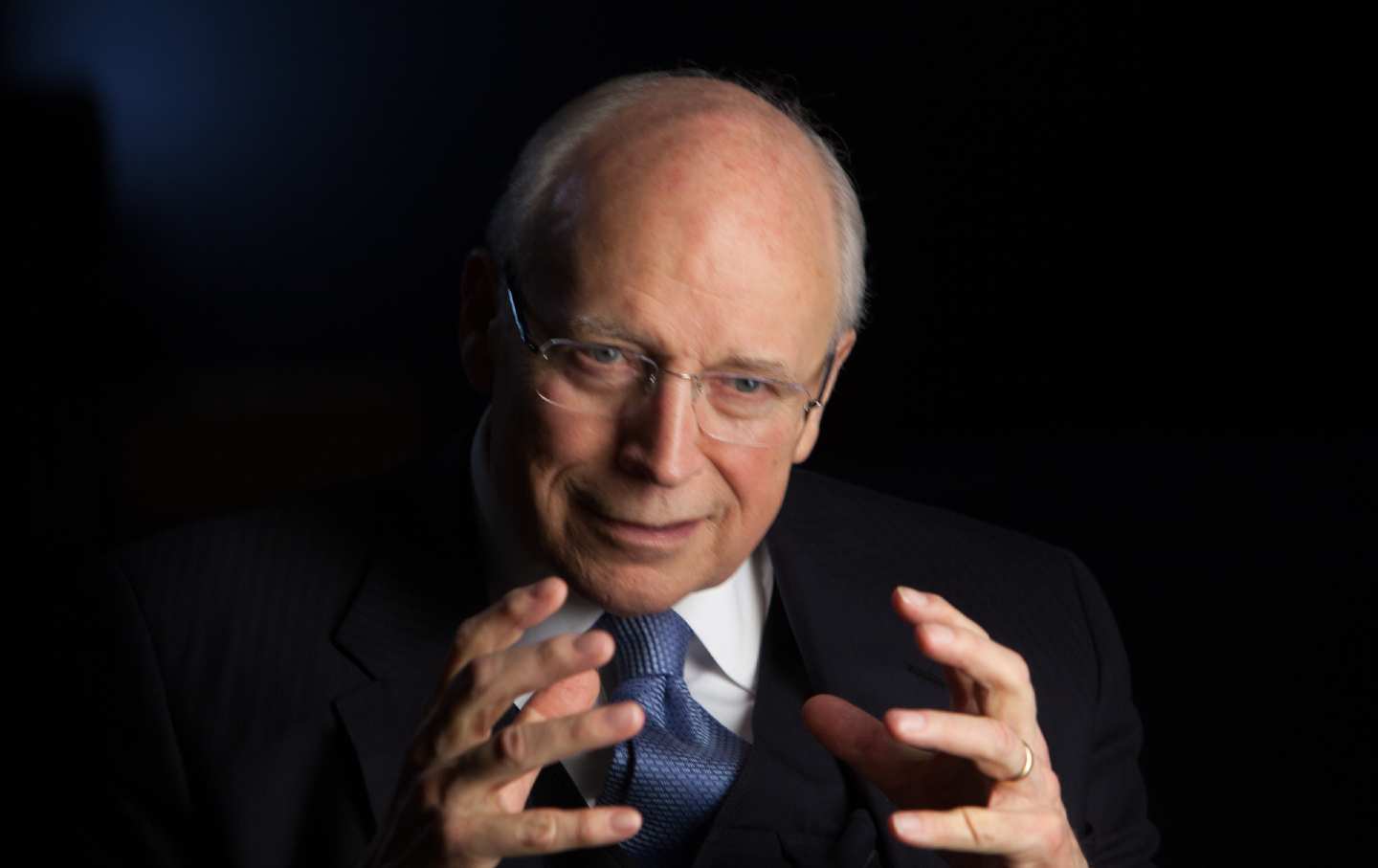Politics / November 4, 2025
As much as the Trumpists claim to disavow the War on Terror, they walk a path paved by the most powerful vice president in US history.

Former vice president Dick Cheney
(David Hume Kennerly / Getty Images)
The week before Dick Cheney died, the Justice Department’s Office of Legal Counsel, one of the bureaucratic venues through which the most powerful vice president in US history disfigured the country, informed Congress that it would have no say over Donald Trump’s rapidly coalescing military aggression against an oil-rich country.
While self-styled War Secretary Pete Hegseth boasted over social media about treating the Caribbean fishermen that he insists without evidence are drug smugglers “exactly like Al Qaeda,” Office of Legal Counsel chief T. Elliot Gaiser told a group of legislators that the administration would not be bothering with congressional authorization for an escalating set of strikes carried out as part of a massive US naval buildup. In Gaiser’s sophistry, because the fishermen are unarmed, US personnel are in no danger, so there is no war that fits the terms of the 1973 War Powers Resolution; it thus follows, in this backward-spooling reasoning, that there are simply no authorities that Congress—the body authorized by the Constitution to declare war—can exercise. Our national legislature, controlled by Republicans loyal to Trump and backfilled with Democrats who seek not the end of the US bloodshed but its constitutionally proper congressional authorization, now faces complete irrelevance as the president pursues a policy of regime change in Venezuela and perhaps a wider campaign of regional destabilization emanating from it.
Cheney, 84, picked an appropriate time to die. His decades-long struggle to consolidate the unparalleled might of US warmaking within the White House has succeeded. “In Cheney’s view,” wrote his biographer Barton Gellman, “the president’s authority was close to absolute within his rightful sphere.” Cheney defined that sphere expansively and fought for his definitions aggressively. When Patrick Leahy accused the former Halliburton CEO of rigging gigantic no-bid contracts for the company in Iraq, Cheney responded, “Fuck yourself.” He later called the exchange “the best thing I ever did.”
The successor presidencies of Democrats Barack Obama and Joe Biden decried the power grabs Cheney pursued but mostly pocketed his gains for their own purposes. (In his case for unrestricted bombing in the Caribbean and Pacific, Gaiser cited Obama’s own marginalization of Congress to bomb Libya in 2011.) Trump now walks a red carpet of lawlessness, plutocracy, and bloodshed woven by Cheney. An uncharismatic Nixon functionary—someone who might never have risen to power had Texas Senator John Tower not drunk himself out of a Pentagon appointment that instead went to Cheney—decisively shaped the destruction of constitutional governance in 21st-century America.
No hell is hot enough or eternal enough for Dick Cheney. Any discussion of his works must begin with the 2021 assessment of Brown University’s Costs of War Project that found, conservatively, that the War on Terror killed between 897,000 and 929,000 people across five of its battlefields. Codirector Neda Crawford called that assessment “a vast undercount,” since it doesn’t take into account the downstream casualties caused by the epidemiological effects of destroying the infrastructure of the countries Cheney helped bomb, invade, and occupy. Cheney shares the blame for what is surely the deaths of more than a million people with many others, especially George W. Bush, the president he served. But while Bush was the self-styled “decider,” Cheney was the most crucial architect the War on Terror had, shaping the decisions Bush made.
Cheney understood the catastrophe of 9/11 as an opportunity to accomplish and cement long-standing objectives. In the early days after the fall of the Soviet Union, Cheney’s Pentagon commissioned a study on the future course of American power from Paul Wolfowitz, an adviser who would later enjoy great influence in the Bush administration. The draft document prioritized the active prevention of a peer competitor to US power from emerging. The objective of US grand strategy would be to preserve military, economic and geopolitical preeminence indefinitely. As he would when he became vice president, Cheney relied on a corps of neoconservative intellectuals he cultivated to supply the pertinent rationales. For Cheney, the virtues of dominance were self-evident. After 9/11, they drove him to favor invading not only Afghanistan but the unconnected country of Iraq, whose regime was an outlier in the world America bestrode. A document contained in an energy task force Cheney convened before 9/11, and that he went to extraordinary lengths to keep secret, detailed “Foreign Suitors for Iraqi Oilfield Contracts.”
When Cheney infamously contended after 9/11 that the United States would have to “spend time in the shadows,” he was not only talking about intelligence work. Cheney accomplished his own agenda as a surrogate chief executive in the bureaucratic shadows. He operated through what former White House attorney Brad Berenson termed a “triumvirate” of lawyers, most notably his legal counsel David Addington, along with White House counsel Alberto Gonzales and Gonzales’s deputy, Tim Flanigan. They extended their influence into the Justice Department’s Office of Legal Counsel through Cheney-aligned attorneys John Yoo and Jay Bybee.
In the months after 9/11, these Cheneyite lawyers, wielding their boss’ influence, created in the shadows an architecture of repression. Addington wrote a draft directive permitting the National Security Agency, in defiance of the Constitution and the Foreign Intelligence Surveillance Act of 1978, to establish a warrantless digital dragnet of phone and Internet metadata generated by the communications of practically every American. Flanigan, aided by Yoo, wrote the 2001 Authorization for Use of Military Force that made the world into a battlefield at the direction of the president. They further permitted, encouraged, and protected the CIA in launching a regimen of torture-as-geopolitical-revenge, masquerading as intelligence gathering, as well as a network of secret prisons to detain the agency’s alleged-terrorist captives indefinitely. They declared that battlefield captives could be held as “unlawful enemy combatants,” deserving none of the protections of the Geneva Convention, and corralled them, without charge, into the military base at Guantánamo Bay until an end of hostilities that might never arrive. With the exception of CIA torture and much of the wholesale domestic acquisition of Americans’ metadata, these authorities and practices, in one form or another, persist to this day.
Cheney did all of this because his deepest conviction was that the presidency was an elected monarchy. Misconstruing an argument of Alexander Hamilton’s from Federalist No. 70, Cheney pursued what became known as the unitary executive theory. It was predicated on the idea of an unencumbered presidency empowered to control every aspect of the executive branch, regardless of any affected office or agency’s intended independence from political decisions. Cheney had understood the post-Watergate reforms from Nixon’s criminal presidency as a congressional usurpation, and he intended to roll them all back. Excluding Congress from wresting any transparency from his secret Energy Task Force was, to Cheney, part of the point. After 9/11, Yoo contended that during wartime—a circumstance conceivably permanent in a War on Terror—presidential authority is all but plenary. He likes his argument a lot less now that Trump uses it to murder fishermen in the Caribbean, but, like his Bush administration colleagues, takes no responsibility for authoring the authoritarian usurpations of power that he now bemoans.
Under Cheney, the consolidation of power within the presidency turned out to also be a consolidation of power within the vice presidency. Many understood Cheney, particularly after 9/11, to be effectively a copresident, dominating the unprepared and incurious Bush. Cheney was never one content to let events unfold on their own terms. As chairman of Bush’s vice-presidential search committee, he nominated himself, and pushed Bush to litigate the disputed 2000 election until five right-wing Supreme Court justices put them in office. To create the public conditions for invading Iraq, Cheney strong-armed the CIA into delivering baseless analytical assessments usefully inflating the danger from Saddam Hussein, who turned out to be helpless. In his public remarks, Cheney outdid even the manipulated CIA product, lying profligately about invented connections between Saddam and Al Qaeda. After Cheney got the war he wanted, he continued to lie that the bloody insurgency it provoked was on its “last throes” years before it reached its nadir.
That was the other legacy of Dick Cheney: fiasco. The wars he wanted did not showcase American power. They put on display American weakness, avarice, futility, and manic resource extraction. The economic agenda of unrestrained capital accumulation that Cheney championed led to the 2008 financial disaster that nearly wiped out the global economy. The pain and bitterness emerging from both conditions would be exploited by Trump, who empowered the nativist political currents galvanized by the War on Terror but, during Cheney’s time, did not enjoy respectability. They also enabled Trump to dismiss the respectable architects of the War on Terror, like Cheney, as sybaritic, incompetent elites, even as Trump builds upon their legacy of violence and deceit. For all his claims to foresight, Cheney never expected to be displaced by what he empowered. He surely did not expect to die on a day when New Yorkers are poised to elect a Muslim socialist mayor in a repudiation of his legacy.
Trump and Cheney were more characterologically alike than either man would prefer to admit. While Trump is charismatic and Cheney was anything but, they both ruled through fear, cruelty, and domination. Not even Trump has gotten his own friend to apologize after shooting him in the face. The impunity Trump enjoys is another aftereffect of Obama’s decision to forgo accountability for the War on Terror and its many institutional crimes. (All it earned the Democrats was an endorsement from Cheney of Kamala Harris that she seemed not to understand was grotesque and self-discrediting.) As Trump prepares an assault on a South American field of resource extraction and deploys federal forces to terrorize American cities, Cheney can eternally look up from his well-earned spot in the afterlife at the fruits of his labor.
Spencer Ackerman
Spencer Ackerman, a Pulitzer Prize and National Magazine Award–winning reporter, is the author of Reign of Terror: How the 9/11 Era Destabilized America and Produced Trump.






